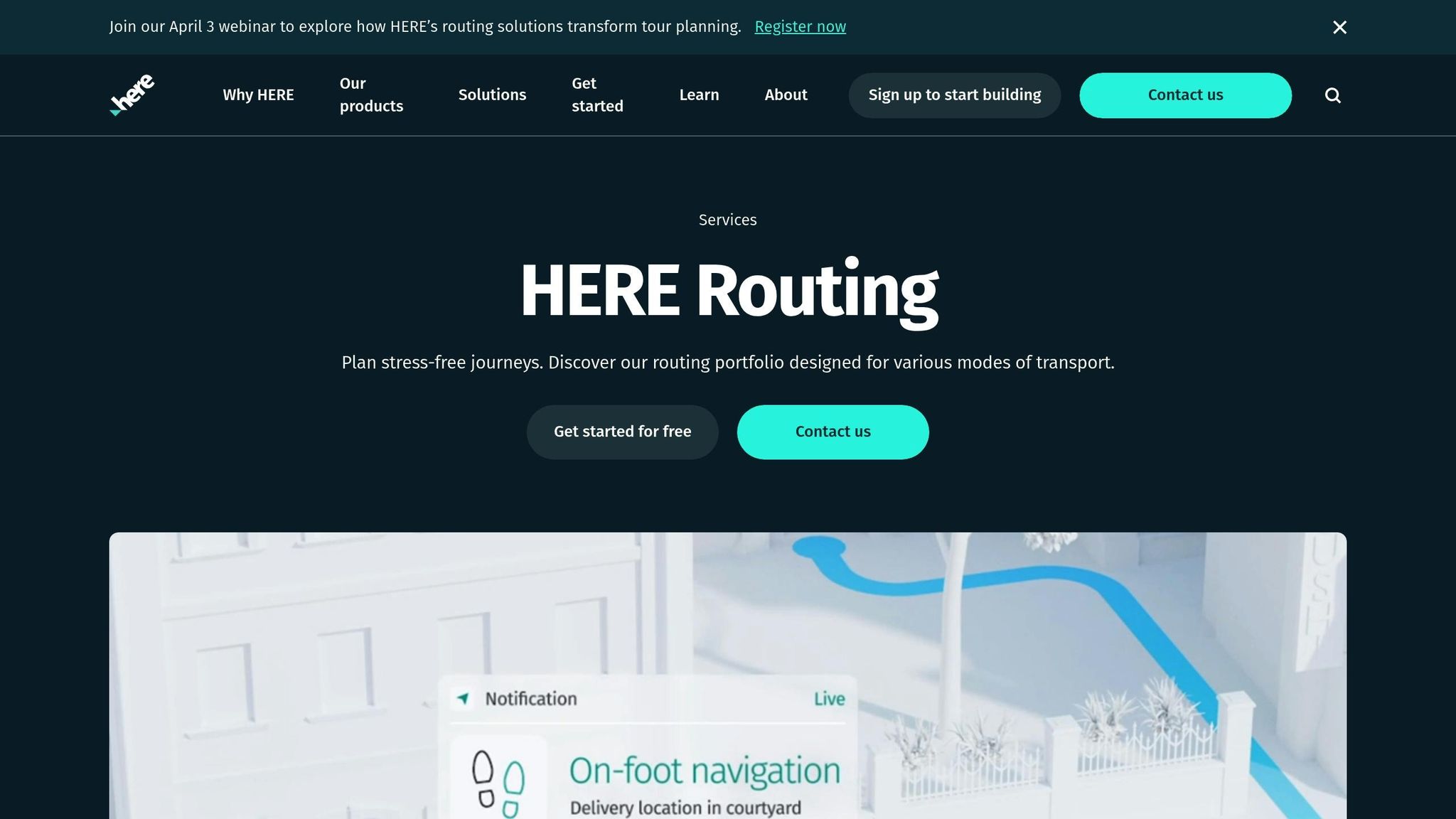Truck Route Rules in Residential Areas

Navigating residential areas with commercial trucks can be tricky due to strict local rules. These rules aim to protect roads, improve safety, reduce noise, and maintain a peaceful environment. Violations can lead to fines, delays, and reputational damage. Here’s what you need to know:
- Size and Weight Limits: Check local restrictions to avoid road damage and ensure safety.
- Time Restrictions: Trucks may be banned during rush hours, late nights, or school hours.
- Signs and Local Laws: Pay attention to "No Trucks" signs, weight limits, and time-based rules.
- Route Planning Tools: Use commercial GPS and official resources to plan compliant routes.
- Permits: Obtain necessary permits for residential deliveries.
- Driver Tips: Understand road signs, communicate with dispatch, and handle wrong turns responsibly.
Proper planning and tools like commercial GPS systems or platforms like MOD24 can help businesses stay compliant and avoid disruptions.
Not All Routes Are Truck-Friendly – HERE Truck Routing

Common Truck Route Rules
Truck route rules in residential areas are designed to ensure safety and compliance. While specific regulations differ by city or town, they generally aim to protect roads and maintain a peaceful environment for residents.
Size and Weight Limits
Residential areas often have restrictions on truck size and weight to prevent road damage and maintain safety. These limits vary depending on the location, so it's important to check local guidelines. Such measures help protect underground utilities, reduce wear on streets, and ensure trucks can safely navigate narrower roads.
Time Restrictions
Some neighborhoods impose time-based limits on truck access. For example, trucks might not be allowed during rush hours, late-night hours, or when school zones are active. There are usually exceptions for emergency vehicles, utility work, or scheduled deliveries. Always check with local authorities or municipal websites for up-to-date schedules, as restrictions can change due to construction, seasonal demands, or special events.
Signs and Local Laws
Residential truck routes are clearly marked with signs that indicate where trucks can and cannot go. Common signs include "No Trucks", weight limit postings, and notices about time-based restrictions. In many areas, trucks are required to stick to designated routes unless making direct deliveries. Paying attention to these signs and local laws is crucial for avoiding fines and planning routes effectively, which will be discussed in the next section.
Route Planning Guidelines
Planning routes carefully helps avoid rule violations and delays, ensuring smoother operations for truck drivers.
Commercial GPS Systems
Truck-specific GPS devices are an excellent tool for navigating safely and efficiently. These systems provide:
- Alerts: Notifications for height, weight, and restricted zones like bridges and tunnels.
- Live Traffic Updates: Real-time information on construction, accidents, and congestion.
- Custom Profiles: Input your truck's dimensions to receive routes tailored to your vehicle.
Always choose a GPS with updated maps to stay ahead of potential issues.
Official Route Resources
Local and state resources are invaluable for accurate route planning. Check:
- Municipal Websites: Access local truck route maps and temporary restrictions.
- State DOT Portals: Find truck route guides and up-to-date information.
- City Planning Offices: Stay informed about seasonal changes or construction-related updates.
Alternate Route Planning
It's smart to have backup routes ready. When planning alternates, consider:
- Street Capacity: Ensure the roads can handle your truck's size and weight.
- Access Times: Verify the availability of alternate routes during your delivery window.
- Delivery Schedules: Make sure the route aligns with your timing needs.
sbb-itb-290b89d
Permits and Special Cases
If your trucks operate in residential areas, you’ll likely need permits. Visit local authority websites to confirm the requirements and submit applications ahead of time. This step should work alongside the GPS tools and official resources mentioned earlier to ensure smooth delivery planning.
Keep in mind that emergencies or construction can change route rules. For example, during emergencies, authorities may temporarily ease restrictions to support essential services. Construction zones might require you to follow detours or temporary traffic guidelines. Pay attention to signage and local instructions in these cases.
To stay on the right side of regulations, work with licensed movers who can handle proper documentation and plan routes that meet compliance standards.
Driver Guidelines for Residential Areas
Driving through residential neighborhoods comes with specific rules that must be followed. These tips will help you stay safe and comply with local regulations during deliveries.
Understanding Road Signs
Pay close attention to signs specific to residential areas, such as:
- Height limits near bridges or overpasses
- Weight restrictions at neighborhood entrances
- Time-specific rules in school zones and quiet areas
- Signs prohibiting commercial vehicles at entry points
If you come across a sign you don’t recognize, and it’s safe to stop, take a photo and share it with dispatch for clarification. This helps you follow the rules immediately and serves as a reference for future trips.
Communicating with Support Teams
Staying in touch with dispatch and support teams is key for smooth residential deliveries. If delivery dates change or delays come up, notify dispatch right away so they can adjust schedules. This teamwork is especially important when plans need to shift unexpectedly.
Wrong Turn Protocol
If you accidentally enter a restricted area, here’s what to do to handle the situation safely and responsibly:
- Stop at the nearest legal and safe spot without blocking traffic.
- Contact dispatch immediately to explain what happened.
- Note the location and any relevant signs.
- Follow dispatch instructions for safely leaving the area.
Always focus on safety and work with your team to address the issue while keeping disruptions to a minimum in residential neighborhoods.
MOD24's Moving Solutions

MOD24 makes residential moving easier by offering services that help you navigate routes and meet all necessary requirements.
Local-Certified Movers
MOD24 connects you with movers who are licensed, insured, and verified. Every company listed is carefully reviewed to ensure they meet licensing and insurance standards, so you can feel confident about your choice.
Easy Move Planning
Planning your move is simple with MOD24’s user-friendly platform. Here’s what you can do:
- Compare trusted, local movers
- Read real-time reviews
- Get quick price estimates
- Reach out to dependable customer support
You can book your move in less than 10 minutes, securing a guaranteed arrival window. Plus, MOD24’s support team is available to assist you throughout the process, making sure everything runs smoothly.
Conclusion
Planning your move while staying within truck route rules in residential areas can feel overwhelming, but it's manageable with the right approach. Careful preparation is key to avoiding fines, delays, or other complications.
MOD24 offers a platform that connects you with movers who know local truck route regulations inside and out. With an impressive 4.6 out of 5 rating from 370 reviews, it provides access to professionals who can handle the logistics while keeping everything compliant.
A smooth move requires both a solid plan and skilled execution. MOD24’s responsive customer support ensures any last-minute changes are handled seamlessly, helping you stay on track without unnecessary stress. Their system simplifies the moving process, so you can focus on other important tasks.

Unpacking Boxes After Moving - The Ultimate Guide
When it comes to relocating, preparing before the move isn't the only challenging process you have t...

FMCSA Hours of Service Rules Explained
FMCSA Hours of Service (HOS) rules are federal regulations designed to prevent driver fatigue and e...

The Ultimate Checklist - 10 Things to Do After Moving
Relocation is one of the most stressful events in personal life. Aside from arranging your relocatio...